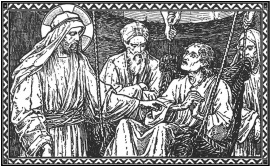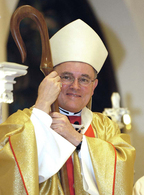
Extraordinary Form Homily September 30, 2012
18th Sunday after Pentecost
The Paralytic
Jesus crossed the lake to his home town of Capernaum. Just as he is getting out of the boat, some men hurry up to the dock to lay down their paralyzed friend, right in front of Jesus. And Our Lord goes to the root of the problem: he cures the man’s sins. Only after healing his sins does he heal his paralysis.
We take two lessons from today’s Gospel.
A Bold Move
Our First Lesson: the paralyzed man’s friends make a bold move by plopping him down right in front Our Lord. They don’t give Jesus any choice but to face their friend, and they don’t give their friend any choice but to face Jesus. St. Thomas writes: “the paralytic symbolizes the sinner lying in his sin; just as the paralytic can’t move, so the sinner cannot help himself.” Those who bring the paralytic to Jesus lead the sinner to God. Most of the time we bring a friend to God by praying to God for his soul. Sometimes more direct action is indicated. A good friend will take a buddy to an AA meeting if circumstances warrant an intervention. A good friend will insist that his brother get to confession if he needs it.
Healing Sin
And this brings us to our Second Lesson: the Sacrament of Penance. This sacrament releases paralyzed limbs and hearts. Imagine paralysis in the ancient world, before motorized wheelchairs, handicapped ramps, and automatic doors. A paralyzed man had to lay on his back for the rest of his life, staring blankly up at the sky. So this paralytic lies in front of Jesus, helpless. Does Jesus cure his paralysis? Yes, but only after he forgives his sins. Our Lord points out that mortal sin is worse than paralysis. Indeed, it is sin that paralyzes. It puts us flat on our backs. The first thing in any distress—physical, emotional, or spiritual—is to go to confession. Jesus heals the man’s paralysis with a word, not only indicating his divinity, but showing how external paralysis only manifests the root problem: the internal paralysis of mortal sin. The first thing in any sickness is to get to confession, because the soul is infinitely more important than anything else. If our souls are all right, the rest of us will be perfectly all right. Even it pleases God to permit a persistent bodily infirmity, we will be all right.
A Pure Heart, a Strong Spirit
St. Maximilian Kolbe was sick from the age of 17. Tuberculosis struck him while in the seminary and left him with only 25% lung capacity the rest of his life. But see how this infirm man founded and oversaw the largest friary in the world, Neopokolanow near Warsaw, with 700 men. At the time of his arrest in 1941, he managed the largest printing business in Poland. He survived three months in Auschwitz while giving his food to others, and in the end freely offered his life for another man in the starvation bunker. Where did he get his extraordinary strength? Not from his weak body, which God never cured in his life. Fr. Kolbe’s remarkable strength came from a pure soul, a heart cleansed of sin.
If we are sick in spirit, and even sick in body, let us look first to our souls. If our nation is sick, let it look above all to its soul. Our Lord wishes to cleanse, heal, and strengthen us, but we must get on our knees before him. We must confess our personal sins, and repent of our national sins. Nothing else matters if the soul is diseased. Our souls must be our first concern.
Let us pray to the Blessed Mother, that she also bring our sick and suffering souls to her Divine Son, that we may share her purity, and the glory God has bestowed upon her, and all the saints.





 RSS Feed
RSS Feed